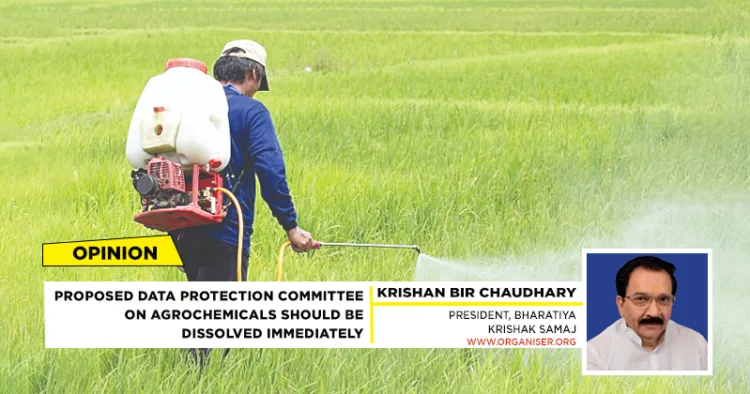It has been learnt that the Ministry of Agriculture and Farmers Welfare has constituted a multi-ministerial committee under the chairmanship of Additional Secretary (Plant Protection) Faiz Ahmad Kidwai. The first task assigned to this committee is to find out how data protection can be given to companies bringing pesticides to India whose patents have expired for 20 years so that they can make huge profits by selling their agrochemicals to the Indian market and farmers at many times the price and exploit Indian farmers.
It should be known that in the last several years, many attempts have been made by multinational companies and Indian industries associated with them to change the rules related to the Insecticides Act 1968. The only objective of all these efforts has been to capture the Indian market in some way or another and exploit the farmers. On this subject, Bharatiya Krishak Samaj has always been of the opinion that those Global Off-Patented Molecules whose patent period of 20 years has been completed in any country of the world should not be given any data protection in India. Due to this, the monopoly of MNCs remains intact even after the patent is over, and the exploitation of farmers continues. According to international rules, the patent period is 20 years; after that, giving any kind of data protection is illegal, which will give a license for looting the farmers by MNCs and their Indian partners.
The import of agricultural chemicals, which was less than Rs 9041 crores in the year 2019-2020, increased to more than Rs 14,315 crore in 2022-23. This situation is not good, and there is an immediate need to control imports. Because if we look carefully at the prices of the products imported by MNCs, then these companies are openly looting the farmers.
Let me present before you some examples: Emamectin Benzoate which was sold by Syngenta company to cotton farmers at Rs. 10,000 per kg in the year 2007, as soon as Indian companies got permission to produce it, it immediately became available to farmers at Rs. 3500 per kg and then at Rs. 2000 per kg.
Similarly, the imported Sulfosulfuron was sold at more than Rs. 48,000 per kg in the year 2001, and today, Indian companies are making it available to farmers at cheaper prices, around Rs.14,800 per kg.
Imported Acetamiprid was sold at around Rs, 6,400 per kg in the year 2001-2002. Today, Indian companies are making it available to farmers at Rs 800 per kg, which is 87 per cent less.
Cypermethrin was imported about 30 years ago at $80 -100 per kg; today, the Indian company is making it available to the farmers of India at $8 per kg and exporting it to the world market at $10 per kg. India is the largest producer of Cypermethrin in the world.
There are many more examples which prove that some Indian industrialists are involved in the scam with MNCs and have exploited the Indian farmers on a large scale.
My experience over the last 35 years shows that multinational companies have appointed some Indian industries as their spokespersons. The business of these Indian industries is linked to multinational companies in some way or the other. These Indian companies advocate proposals like data protection, which exploit farmers. There is a need to be cautious about the network of multinational companies because the people who get some special facilities in getting such illegal provisions made are engaged in lobbying for them, and by misleading the administrative officers, they also violate such international agreements in the wrong ways.
Considering the above facts and the Prime Minister’s vision of ‘Make in India’, the proposed data protection committee should be dissolved immediately to promote Indian industries providing cheaper and effective generic molecules to the farmers to protect their crops.
















Comments